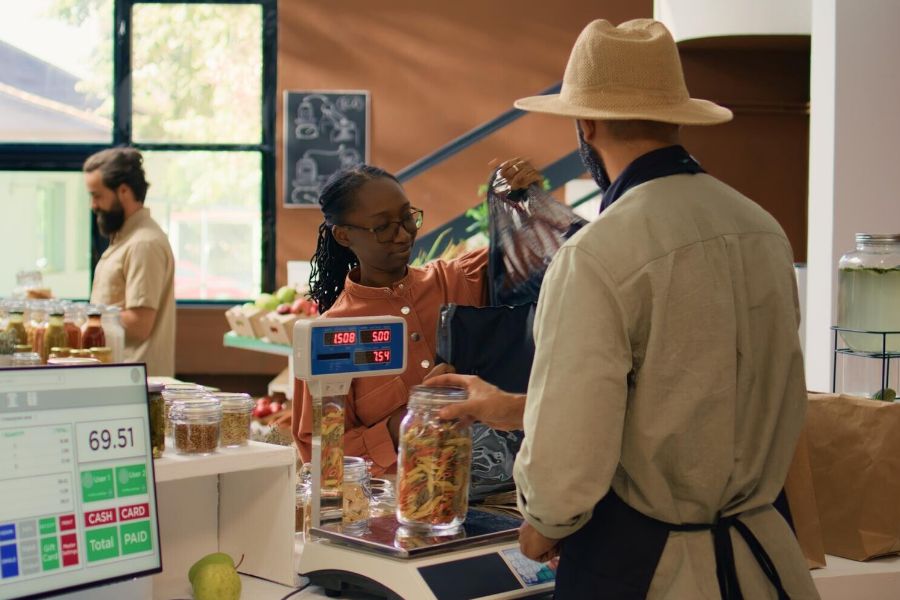The guide for NetSuite POS integration in Thailand is your go-to resource for optimizing your business operations in this vibrant Southeast Asian market. This integration comes with specific features tailored to Thailand’s unique requirements; this guide will walk you through the setup process and introduce you to a trusted solution, ConnectPOS. Let’s explore the key features and steps to seamlessly integrate NetSuite in Thailand.
Specific Features Of The Netsuite POS Integration In Thailand
The NetSuite POS integration in Thailand offers specific features that enhance various aspects of your business. In terms of General Setup, it provides a user-friendly configuration to tailor the system to your needs. The integration seamlessly handles Accounting tasks, making financial management more efficient. Order Management is streamlined for smoother processing, ensuring customer satisfaction. To optimize your experience, it also recommends SuiteApps, additional software applications that can enhance your NetSuite POS system’s capabilities.
General Setup
Thailand-specific Configuration: NetSuite POS integration in Thailand allows for setting up Thailand-specific features and preferences, enabling businesses to adapt their NetSuite instance to the local business setting. This includes language preferences, number formats, date formats, and other settings tailored to Thailand’s requirements.
Multilingual Support: NetSuite offers support for multiple languages, enabling users to work in their preferred language. This is indispensable for international business activities.
Accounting
Banking: NetSuite provides support for multiple file formats for bank account statements, facilitating bank statement imports for reconciliation.
Bank Statement Parsers: Standard parser plug-ins, such as MT940, are available for reading bank statement files, streamlining the bank reconciliation process.
Auto Bank Statement Import: The Auto Bank Statement Import (ABSI) SuiteApp automates the daily import of bank statement files into NetSuite. It securely connects to financial institutions for efficient data transfer.
Thailand Tax Topics: NetSuite offers specific features related to Thailand’s tax requirements, including pre-configured VAT tax codes, automatic VAT calculation, and support for Thailand’s VAT Return Form P.P.30.
Supplemental VAT Reports: These reports are formatted to match local standards and are designed for Thai businesses to meet their tax reporting needs.
VAT Reporting by Location: Businesses using NetSuite’s Locations feature can generate the Thailand VAT Return Form P.P.30 for each location, facilitating VAT reporting for multi-location enterprises.
Order Management
Invoicing: NetSuite POS integration in Thailand provides customizable templates for tax invoices and credit memos that comply with Thai Revenue Department requirements and local business practices.
Branch ID Field: A field is available for entering branch codes assigned by the Thai Revenue Department, handy for businesses with multiple branches or locations.
Transaction Amount in Words Field: This field allows the input of the transaction amount in words, ensuring legal and financial document compliance.
Recommended SuiteApps
International Tax Reports: This SuiteApp supports VAT (Value Added Tax) and GST (Goods and Services Tax) reporting for over 42 countries across Europe, Asia, and Latin America. It generates reports in the local format, simplifying submission. It includes reports like EU Sales List reports, Intrastat reports, and pre-configured tax codes for new tax nexus creation.
Southeast Asia Localization: Specifically designed for Thailand, this SuiteApp offers invoicing features that meet regulatory requirements and local expectations. It includes templates for tax invoices and credit memos, as well as electronic bank payment file formats for Thailand.
These specific features of the NetSuite POS integration in Thailand cater to the unique requirements of businesses operating in the Thai market, ensuring efficient financial management, compliance, and operational support.
How To Set Up Netsuite Integration In Thailand
Setting up NetSuite POS integration in Thailand involves several key steps to ensure that the software is configured to meet local requirements. Here’s a guide on how to set up NetSuite integration in Thailand, broken down into four main sections:
Establishing Enabled Features
Log in to your NetSuite account and navigate to Setup > Company > Setup Tasks > Enable Features.
On the “Company” subtab, under the “International” section, ensure the following options are checked as needed:
- “Multi-language” (if using more than one language in NetSuite).
- “Multiple Currencies” (if using more than one currency in NetSuite).
On the “SuiteCloud” subtab, make sure to check all the boxes under the “SuiteBuilder,” “SuiteScript,” and “SuiteGL” sections. These settings allow for a more comprehensive range of capabilities in your NetSuite account.
Setting SuiteCloud and SuiteApps
Within SuiteCloud, ensure that the following SuiteCloud features are enabled:
- “SuiteBuilder”: This enables customization of records and forms to meet your business’s specific needs.
- “SuiteScript”: This allows for scripting and automation of processes within NetSuite.
- “Custom Plug-ins” offers the capability to incorporate personalized functionalities.
For businesses operating in multiple subsidiaries and countries, consider consulting the “OneWorld Overview” for additional features and considerations.
Install or confirm that specific SuiteApps are available for your Thailand operations when setting up NetSuite POS integration in Thailand. These SuiteApps may include:
- “Electronic Bank Payments”: Facilitates electronic payment transactions with Thailand banks for vendor bills, employee expenses, and customer payments.
- “Payment Gateway”: Provides integration with payment gateways (e.g., AsiaPay, AsiaPay External Checkout, eWAY Rapid) for credit card transactions.
- “Southeast Asia Localization”: Offers templates for tax invoices and credit notes aligned with Thai tax requirements, and includes additional electronic bank payment file formats.
- “International Tax Reports”: Provides pre-configured VAT tax codes, rates, and tax Form P.P.30 for Thailand.
Setting NetSuite Company
Navigate to Setup > Company > Setup Tasks > Company Information.
Customize the company settings for Thailand as follows:
- Set the “Currency Locale” to “Thailand.”
- Define the “Currency Symbol” as “THB” (Thailand Baht).
- Specify the “VAT Registration Number” in the “VAT Registration No.” field. This is essential for tax compliance.
Setting User Preferences
NetSuite allows individual users to personalize their experiences. To set user preferences suitable for using NetSuite in Thailand:
- Access the Home page, hover over the Home icon, and click “Set Preferences.”
- On the “General” subtab, within the “Localization” section, configure the following locale-specific preferences:
- In the “Time Zone” field, select “(GMT+07:00) Bangkok, Hanoi, Jakarta.”
- To adjust the date formatting settings, configure the “Date Format” to be “DD/MM/YYYY” and set the “Long Date Format” to “DD Month YYYY” within the “Formatting” section.
By following these steps, you can effectively set up NetSuite integration in Thailand, ensuring that your NetSuite instance is configured to meet local legal and business requirements, while also providing a personalized experience for users.
Why Should You Choose ConnectPOS For Your Netsuite POS Integration In Thailand?
Choosing the right integration solution for your business is crucial when it comes to NetSuite POS integration in Thailand. ConnectPOS is a compelling choice for several reasons.
- Comprehensive NetSuite Integration: ConnectPOS is designed specifically for seamless integration with NetSuite. This means you can trust that your financial and operational data will be accurately synchronized between your point-of-sale (POS) system and your NetSuite ERP. This comprehensive integration ensures that you have a real-time and accurate view of your business performance.
- Thailand-Specific Localization: ConnectPOS understands the importance of catering to local market needs. In Thailand, where tax regulations and business practices can be unique, having a system that can adapt to these specific requirements is invaluable. ConnectPOS offers Thailand-specific features, templates, and tax compliance support, making it an ideal choice for businesses operating in Thailand.
- User-Friendly Interface: ConnectPOS is known for its user-friendly interface. It’s intuitive and easy to navigate, which is important for your staff who may be handling sales and customer interactions. This user-friendliness ensures minimal training requirements and a smoother transition to the new system.
- Multi-Store and Multi-Device Support: Whether you have multiple stores in different locations across Thailand or you need the flexibility to use various devices for sales, ConnectPOS supports this. It’s essential for businesses looking to expand and adapt to different environments.
- Real-Time Inventory Management: ConnectPOS allows you to manage your inventory in real-time. This feature is critical in ensuring you never oversell or run out of crucial products. It helps maintain customer satisfaction and ensures you make the most of your available stock.
- Customer Relationship Management (CRM): ConnectPOS enhances your customer relationship management capabilities. You can track customer data, purchase history, and preferences. This allows you to offer personalized service, which is vital for building long-term customer loyalty.
- Integration with Payment Gateways: The NetSuite POS integration in Thailand with various payment gateways, including local and international options, ensures your customers have convenient and secure payment options. This is especially important in a market like Thailand, where diverse payment methods are in use.
- Support and Ongoing Updates: ConnectPOS provides support and regular updates to ensure your system stays current and secure. Their dedicated support team can assist with any issues or customization needs you may have.
Overall, ConnectPOS offers a robust and localized solution for businesses seeking NetSuite integration in Thailand. It combines essential features, user-friendliness, and support specific to the Thai market, making it a top choice for businesses looking to streamline their operations and enhance their customer service in this region.
Conclusion
Navigating the intricate landscape of Thai business operations is made more accessible with the guide for Netsuite POS Integration In Thailand. The specific features discussed here, the comprehensive setup instructions, and the compelling case for ConnectPOS make it clear that this integration can greatly benefit your business. By embracing this powerful solution, you’ll be well-prepared to thrive in the dynamic Thai market, ensuring efficiency, compliance, and exceptional customer service. If you desire to acquire further information, please reach out to us.
►►► See our products: Magento POS, BigCommerce POS, Shopify POS, Woocommerce POS, NetSuite POS, Commercetools POS, Custom POS, White label POS, Customer Experience Solution and Next-Gen POS




